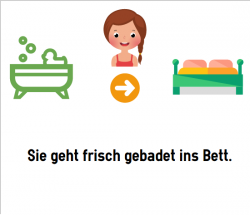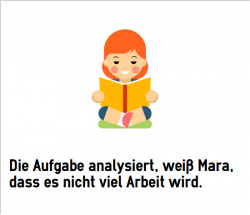German past participle (participle II)
Sign up for free to get all information about private lessons and our available group courses (A1, A2, B2, B2, C1, C2)
Sign up for freeSign up for free to get all information about private lessons and our available group courses (A1, A2, B2, B2, C1, C2)
Sign up for freeIn the following you fill find information about the formation and the usage of the past participle.
There are three different ways to form the past participle of a verb.
Take online language lessons with a professional teacher
A regular weak verb doesn't change its word stem in the past participle. It is formed as follows: ge + stem + -t . The ending -t widens to -et in verbs whose stem ends in -d, -t and -n.
| weak verb | past participle |
|---|---|
| prüfen | geprüft |
| arbeiten | gearbeitet |
| baden | gebadet |
The verbs end in -ieren are also weak verbs. They don't have a ge- prefix in their past participle form. 
| weak verb | past participle |
|---|---|
| analysieren | analysiert |
| reparieren | repariert |
| idealisieren | idealisiert |
If you don't remember the meaning of these verbs, please click on separable and inseparable verbs in order to receive more information.

| verb | past participle |
|---|---|
| besuchen | besucht |
| erzählen | erzählt |
| umfahren | umgefahren |
| fehlschlagen | fehlgeschlagen |
You use the past participle for the passive voice, the compound tenses, as attributive adjective or instead of a subset where one action leads the other.
| past participle | use of past participle |
|---|---|
Die Aufgaben wurden vom Lehrer geprüft. (Your tasks have been checked by the teacher) | passive voice |
Die Geschwister haben sich heute wiedergesehen. (The siblings saw each other again today) | compound tense |
Den Radiobericht gehört, weiß sie, dass Fett dick macht. (Having heard the radio report, she knows that fat makes one overweight) | one action leads the other |
Darum lässt er die geöffnete Tür offen. (That's why he leaves the open door open) | attributive adjective |